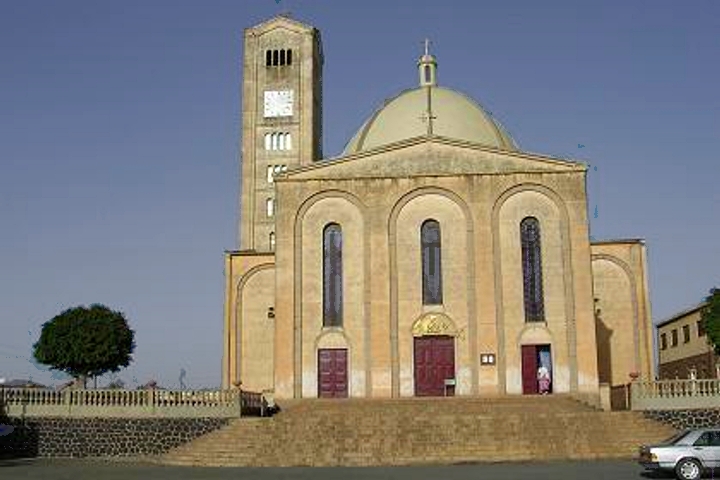
Eritrean Catholic Church
The Eritrean Catholic Church [a] or Eritrean Eastern Catholic Church is a sui iuris (autonomous) Eastern Catholic church based in Eritrea. As a particular church of the Catholic Church, it is in full communion with the Holy See. It was established in 2015 when its territory was separated from the Ethiopian Catholic Church. The church is organized under a metropolitan bishop who exercises oversight of a number of suffragan dioceses.[2] In its liturgical services, it uses the Alexandrian Rite in the Ge'ez language.[3]
Eritrean Catholic Church
1868
Eritrea
(1)
167,722 (2017) [1]
It holds to the Christological definition taught at the Council of Chalcedon and accepts the universal jurisdiction of the Pope. These religious beliefs distinguish it from the Eritrean Orthodox Tewahedo Church, which is an Oriental Orthodox church comprising most of the Christians in the country.
History[edit]
Pre-20th century[edit]
In 1839 Giustino de Jacobis, an Italian Vincentian priest, arrived as a missionary in the area that is now Eritrea and northern Ethiopia. He preferred to employ the local liturgical rite in the Ge'ez language rather than the Roman Rite in Latin. He attracted a considerable number of local priests and laity to enter into full communion with the Catholic Church. He died in 1860 at Halai, near Hebo, in what is now the Southern Administrative Region of Eritrea.[4]
In 1869, Italy began to occupy Eritrea and in 1890 declared it a colony of the Kingdom of Italy, fostering immigration of Italians. In view of the changed situation, the Holy See set up on 19 September 1894 the Apostolic Prefecture of Eritrea, entrusted to Italian Capuchins, thus removing Eritrea from the territory of the Apostolic Vicariate of Abyssinia of the Vincentians, who were predominantly French.[5][6] In the following year, the governor of the colony expelled the remaining Vincentian priests on the unfounded suspicion of having encouraged armed resistance.[7][8][9]
Most of the local population who became Catholics had been members of the Coptic Orthodox Church, whose Ethiopian portion became the Ethiopian Orthodox Tewahedo Church in the mid-20th century when it was granted its own patriarch by Cyril VI, Pope of the Coptic Orthodox Church of Alexandria. They kept the rites of that Church in the ancient liturgical language of Ge'ez, giving rise to an Ethiopic-Rite Catholic community.[10]
There are four eparchies (bishoprics) in the country:[21]
Relations with Government of Eritrea[edit]
Since 2004, the State Department of the United States of America has repeatedly listed the State of Eritrea as a country of particular concern with regard to religious freedom. However, it indicates that the Catholic Church is granted some favours, limited in number and extent, not granted to other religious communities: "permission to host some visiting clergy; to receive funding from the Holy See; to travel for religious purposes and training in small numbers; and to receive exemptions from national service for seminary students and nuns".[27] National service is demanded of most Eritreans, men and women, between the ages of 18 and 40, or in practice 50 or more, and is often of indefinite length.[28][29][30]
The Catholic bishops issued on 25 May 2014, the 23rd anniversary of the independence of the state, a pastoral letter that some saw as critical of the Government. An English translation of the document, the original of which is in the Tigrinya language, extends to 17 pages.[31] The bishops spoke of the emigration of the many young Eritreans who risk their lives in the hope of emigrating to other countries.[32] They repeated what they had written in 2001: "No-one leaves a land of milk and honey to seek another country offering the same opportunities. If one's homeland is a place of peace, jobs and freedom of expression there is no reason to leave it to suffer hardship, loneliness and exile in an effort to look for opportunity elsewhere."[33] They spoke also of "the delusion engendered as result of the non-achievement of the ends proposed, the uselessness of one’s own aspirations, looking to distant lands as the only alternative for self-fulfilment, are bringing a growing number of people to frustration and desperation. They find themselves looking at a horizon that grows always darker and heavier. Alongside this, the breakup of the family unit inside the country – through military service unlimited in terms of time and monetary reward and through the imprisonment of many young people in actual prison or in punishment camps – is exposing to misery not only elderly parents with no visible means of support, but also entire families and it is having serious consequences at the economic level as well as at the psychological and mental levels."[34]
The Eritrean agency TesfaNews questioned the bishops' sincerity and interpreted leaked diplomatic cables as evidence that the Archeparch of Asmara "is a certified, anti-government and National service religious leader residing at the helm the capital Asmara".[35]